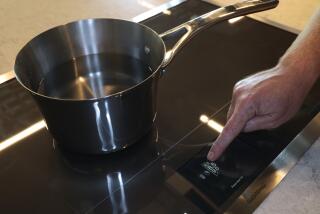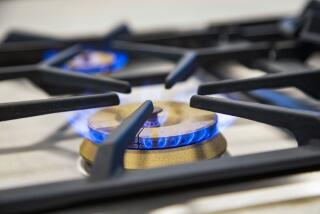European Washers Are More Energy-Efficient
- Share via
QUESTION: Living in Europe has caused me to compare American and European clothes washers and how they function. The European washer typically heats its own water internally, unlike the American washer, which draws its hot water from the hot-water tank.
Which of these systems is more efficient? Are European-style washers available in the United States?
ANSWER: European washers are designed for the European home water-heating system, which uses on-demand water heaters to heat water as it is needed. This is more energy-efficient than the American system, which heats water and stores it in a tank for use later. The storage tank loses heat constantly, and hence is always wasting energy.
In the Northwest, energy costs for heat loss from the tank can be $20 to $60 per year, depending on tank location, insulation and other factors. In Europe and other parts of the United States, these costs would be even greater since electricity is more expensive.
While European water heating is more efficient, converting to a European clothes washer alone won’t accomplish much and you may encounter a few obstacles. The European washing machine has an on-demand heater built into the washer, which provides the hot water needed for clothes washing.
Using a washer like this--without providing on-demand heating for all your hot-water needs--would not save much energy since heat losses from your hot water tank would remain the same. Also, European appliances run on 240 volt current, while North American households are wired for 120-volt power. You may have problems with wiring compatibility.
The best way to save energy and money on water heating is to set back the water temperature to 120 degrees, insulate the tank and pipes, and install water-saving shower heads and faucet devices.
In the future, when your water heater needs to be replaced, consider buying an energy efficient model. They are well-insulated and lose much less heat than conventional water heaters. Many electric utilities in Puget Sound offer $50 to $70 rebates for replacement with new, efficient models.
A more daring approach would be to replace the water tank with a demand water heating system. The replacement cost is initially high, but energy and money savings can pay for this in the long run.
For more information on hot water conservation or demand water heaters, send $1 check or money order payable to Los Angeles Times to Home Wise, c/o Real Estate Department, The Los Angeles Times, Times Mirror Square, Los Angeles, Calif. 90053.
Manually Starting Pilot Lights Can Save Energy
Q: I’m getting ready to buy a gas range and have been looking at new and used models. Some of the older, used models have a lot of character and would fit nicely with the decor of my kitchen. Unfortunately, they use a pilot light instead of electronic ignition to light the burners. What’s the cost of using the pilot light?
A: Ranges equipped with pilot lights use roughly 40 therms of gas more per year than ranges with electronic ignition, according to Washington Natural Gas. At current rates, pilot lights would cost about $20 per year.
Gas ranges typically have two to three pilot lights, one for each set of burners and one for the oven. They burn gas 24 hours per day all year long. In an effort to reduce energy consumed by pilot lights, manufacturers designed electronic ignition systems, which use an electric coil to light the burner when needed. All new gas ranges and furnaces are equipped with electronic ignition devices.
Fortunately, there’s a way out of using the pilot light on gas ranges. Shut it off and light the burners manually with a butane lighter, a piezoelectric igniter, or a spark cup. Kitchen store outlets carry these lighters. This way, you can enjoy the character of an old time gas range without wasting the money and energy for the pilot light.
Produced by the Washington Energy Extension Service, a division of the Washington State Energy Office. Reader questions cannot be answered individually. Questions of general interest will be addressed in this column.
More to Read
Inside the business of entertainment
The Wide Shot brings you news, analysis and insights on everything from streaming wars to production — and what it all means for the future.
You may occasionally receive promotional content from the Los Angeles Times.










